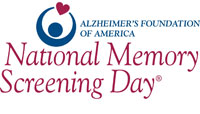On November 18th, we will be holding free memory screenings for National Memory Screening Day. While this may sound like a scary thing, early detection is key to providing you with the best treatment options. Memory screenings are a simple and safe method to evaluate memory and thinking skills. It will indicate if an additional check is needed by a qualified healthcare professional.
Memory Screening Process: How it Works
- These face-to-face screenings take place in a private setting where only you and the screener are present.
- The screenings consist of questions and/or tasks that are designed to test memory, language skills, thinking ability, and other intellectual functions.
- There are a series of screening tools that have been deemed effective by the AFA’s Memory Screening Advisory Board, all meeting specific criteria: effective, easy to administer and validated by research. The tools include the GPCOG (General Practitioner Assessment of Cognition), MINI-COG, MIS (Memory Impairment Screen) and BAS (Brief Alzheimer’s Screening).
- After screening, the person who administers it will be able to discuss the results with the person being screened, suggesting whether or not they should follow up with a physician or other qualified healthcare professional.
- All screenings are confidential. The person will have the screening results to bring to a healthcare professional for follow-up and/or inclusion in medical files.
Resource: http://nationalmemoryscreening.org/memory-screening-process.php


